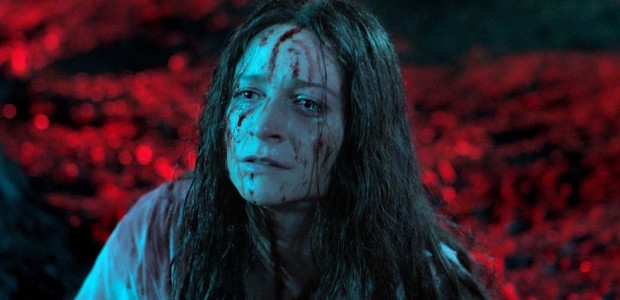In the 1980s, England was in the throes of a moral panic that was spurred by the Video Nasties, a label given to a list of B-horror and exploitation films filled with violence, gore, and rape. These films were thought to be the cause of the country’s crime rate increase, as the government desperately tried to point the finger at some outside cause. These films, which included THE EVIL DEAD, DRILLER KILLER, and I SPIT ON YOUR GRAVE, were subjected to extensive censorship dictated by an arbitrary group of censors. In her feature film debut, CENSOR, director Prano Bailey-Bond tackles this part of English history through the lens of one of those censors.
Enid (Niamh Algar) takes her job very seriously, as if she is the sole protector of British society wielding her film-slashing sword. A male coworker criticizes her meticulous process and calls her “Little Miss Perfect.” But Enid doesn’t necessarily take joy in her work; she instead sees it as a method of control after losing her sister when they were children. If she can have authority over what images the public sees, then she can prevent any more violence. But her self-appointed quest leads her to relive her trauma and perhaps fall under the blood-drenched spell of Video Nasties she has tried so desperately to avoid.
CENSOR echoes the current ongoing debate about whether or not violent video games are breeding a generation of sociopaths. But, instead of placing the issue in black and white, good versus bad, Bailey-Bond addresses representations of violence with nuance, never declaring that Video Nasties are the disease crumbling the good and proper British population. Instead, she contrasts over-the-top violent images in these films with violence shown on the news, as if exaggerated fictional violence is somehow worse than the horrific events that unfold in the world on a daily basis.
Bailey-Bond also opens up a discussion about genre film as a way to process trauma, whether that is a good or bad thing in the case of CENSOR. During a screening, Enid is taken back to the disappearance of her sister, as if the director took her repressed memories and placed them on screen. The trauma that Enid has kept locked into the darkest corner of her brain is awakened by the images on screen, an experience that I have had myself. While the act of being triggered is so often uncomfortable and distressing, there is something to be said about using fictional narratives as a place to start to decipher that trauma. Yet, in the case of Enid, fiction and reality become too closely intertwined and her method of coping is, to put it lightly, destructive.
Algar’s performance is what truly sells the film. Her slow unraveling is subtle at first, marked with biting her names and picking at her cuticles. Then strands of hair fall out of her perfectly made bun. Then it goes downhill from there. Algar’s facial expressions are able to subtly capture feelings of sorrow, confusion, and rage all at once. Even though Enid’s character is all about external composure — she never really smiles or frowns, she just stares — Algar is able to portray tumultuous emotions just through her eyes. Yes, Enid seems stone-faced but looking into her eyes tells a different story.
CENSOR is also a feast for the eyes, fluctuating between the sterile fluorescent lights of an office to the signature red and pink lighting in the giallos of the 1970s. Bailey-Bond is turning her movie into a piece of exploitation cinema through the hands of its very enemy, and the use of lighting emphasizes that point. Once red light soaks the scene, there is no denying that Enid is no longer within her sphere of control; she has entered another world.
Exploitation cinema is often regarded as male-dominated and misogynistic, a genre where women are tortured and reduced to nothing for male pleasure. In this homage to 1980s B-horror, Bailey-Bond shows that this type of filmmaking is not just for the boys. Women can love the gore, the violence, and the spectacle, too. They can write gory, violent narratives that center on women without graphic rape scenes and torture. In fact, they can make their “protagonists” the bad guys; CENSOR is a scream to let women be gross and to be OK with that. And that’s a scream I will gladly join in on.
Tags: Adrian Schiller, Annika Summerson, Anthony Fletcher, B-Movies, Emilie Levienaise-Farrouch, England, Festivals, Great Britain, Horror, Mark Towns, Michael Smiley, Niamh Algar, Nicholas Burns, Prano Bailey-Bond, Sophia La Porta, Sundance, Sundance Film Festival, The UK, Video Nasties, Vincent Franklin



No Comments